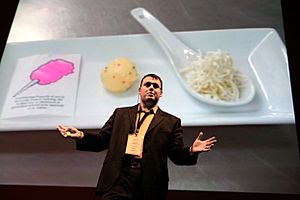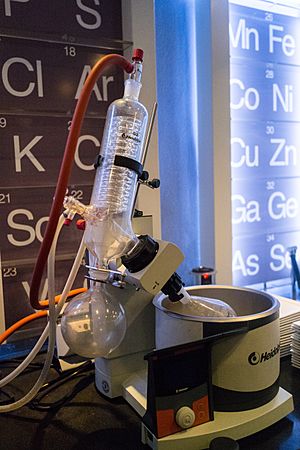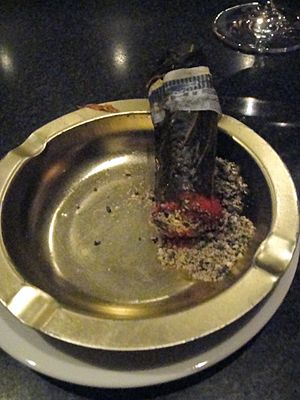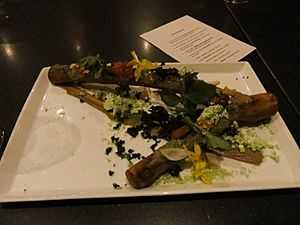Homaro Cantu facts for kids

Cantu at the 2008 Cusp Conference
|
|
| Born | Homaro Cantu Jr. September 23, 1976 Tacoma, Washington, U.S. |
|---|---|
| Died | April 14, 2015 (aged 38) Chicago, Illinois, U.S. |
| Cooking style | Molecular gastronomy |
| Education | Western Culinary Institute |
| Spouse |
Katie McGowan
(m. 2003–2015) |
|
Rating(s)
|
|
|
Current restaurant(s)
|
|
|
Previous restaurant(s)
iNG
|
|
|
Television show(s)
Future Food
|
|
Homaro "Omar" Cantu Jr. (September 23, 1976 – April 14, 2015) was an American chef and inventor. He was famous for using molecular gastronomy, which means he used science to create surprising and new kinds of food.
As a child, Cantu loved science and engineering. He realized that cooking was a lot like science. This made him want to become a chef. In 1999, he got a job with his hero, chef Charlie Trotter in Chicago. In 2003, Cantu became the first chef at a restaurant called Moto. He later bought the restaurant.
At Moto, Cantu explored many unique cooking ideas. These included menus you could eat, fizzy fruit, and food cooked with a laser. At first, people thought his ideas were just a novelty. But Moto soon became very popular and earned a Michelin star in 2012. Cantu's other restaurants, iNG and Berrista, focused on using "miracle berries" to make sour foods taste sweet.
Besides being a chef, Cantu was also a TV personality and an inventor. In 2010, he helped create and host a show called Future Food. He often talked about ending world hunger. He believed his edible paper and the miracle berry could help a lot. Cantu also gave his time and money to many charities. He even patented several cool food gadgets.
Contents
Early Life and Inspiration
Cantu was born in Tacoma, Washington, on September 23, 1976. His father was an engineer who built things. Because of this, Cantu loved science and engineering from a young age. He once took apart the family lawn mower three times to learn how it worked! His Christmas gifts often ended up in many pieces as he explored them.
Cantu said he was a "problem child" growing up in Portland, Oregon. From age six to nine, he didn't have a home. He later said this experience inspired him to make food and help others. When he was twelve, Cantu almost went to jail for starting a big fire. After that, he started working at a fast food restaurant. He became interested in cooking when the owner bought a special tandoori oven. After high school, a kind couple, Bill and Jan Miller, offered Cantu a place to live. The only rule was that he had to go to culinary school.
Becoming a Chef
Cantu graduated from the Western Culinary Institute. For the next two years, he worked short internships at many restaurants on the West Coast. After about 50 of these two-week to one-month jobs, he was ready for a paid position.
In February 1999, he decided to try to work for his idol, chef Charlie Trotter. Cantu said, "I made it my life's goal to become a sous chef for Charlie Trotter." He flew to Chicago with only $300 and no place to stay. Trotter first thought Cantu was rude, but he agreed to an interview. He hired Cantu the next day. Cantu eventually became one of Trotter's sous chefs. On his days off, he started exploring new ways to prepare and serve food.
In 2003, Cantu heard about a chef opening at a new restaurant called Moto. The owner, Joseph De Vito, first wanted the restaurant to serve Asian fusion food. But Cantu cooked an amazing seven-course meal for him. It included an exploding ravioli and a small table-top box that cooked fish. After that, De Vito hired Cantu.
When Moto opened in January 2004, guests were at first confused by the unique tasting menu. But the restaurant quickly became known for its experiments. Dishes included carbonated fruit and menus printed on edible paper. They even cooked fish and bread from the inside out using a special class IV laser. Every week, Moto chefs had meetings to brainstorm new food ideas. They talked about how they could change foods they ate that week.
Some people said Moto cared more about being clever than making delicious food. But in 2012, Moto earned a Michelin star. Other chefs had different opinions about Cantu. Some called him a "faddish flavor of the month," while others called him a "creative genius." Chef Grant Achatz said Cantu was "an ambassador of creative food." Cantu, Achatz, and Graham Elliot helped Chicago become famous for innovative food. Chef Ferran Adria also praised Cantu for exploring the limits of cooking.
Cantu's second restaurant, iNG, focused on "flavor-tripping." This meant using the "miracle berry" to make sour foods taste sweet. The restaurant lost money and closed in 2014. After iNG closed, Cantu opened a coffee house called Berrista, using the same miracle berry idea. At the time of his passing, he was planning to open a brewpub called Crooked Fork. In 2016, his friends opened the brewpub, now called Old Irving Brewing Company.

Cantu was also a very active inventor. He filed more than 100 patent applications. He even made deals with NASA and Whirlpool to use his inventions. His inventions included new kitchen tools, a special cooking box that kept food cooking after it left the heat, and an edible printer. He called the printer the "food replicator," like in Star Trek. Cantu also turned Moto's office into an indoor farm to grow vegetables. This farm had a special "vortex aerator." Food writer Pete Wells said Cantu was one of the first chefs to make money by licensing his inventions.
Media Appearances
In 2007, Cantu appeared on Iron Chef America. He beat chef Masaharu Morimoto in the competition. In that episode, Cantu used a laser to caramelize edible packaging. He also used liquid nitrogen to make beet "balloons." He returned to the show in 2013 for a rematch with Morimoto, but he lost that time.
Also in 2007, Cantu was featured in the documentary series Unwrapped and on Dinner: Impossible. He appeared on Good Morning America and twice on The Ellen DeGeneres Show. He was also on Roadtrip Nation and was a guest judge twice on Hell's Kitchen. Cantu was featured in the At the Table with ... series and the British science show Horizon. He appeared on CNN's The Next List in 2011.
In 2010, Cantu produced and co-hosted a TV show called Future Food on Discovery's Planet Green.
After his passing in 2015, a documentary film called Insatiable: The Homaro Cantu Story (2016) was made about him. It premiered at the SXSW Film Festival in March 2016.
Advocacy and Helping Others
Cantu said his main goal was "changing the way humans perceive food." He saw his edible paper as a fun idea for customers. But he also saw it as a way to fight world hunger. He said, "My goal with this is to deliver food to the masses that are starving." He wanted to create food that was healthy, lasted a long time, and was very cheap to make. He also thought it could be used in space missions or refugee camps.
Cantu was also a big supporter of "miracle berries." He believed these berries could end hunger. They would allow people to eat foods that usually taste bad and help reduce the need for processed sugar. On Future Food, Cantu showed this idea by eating only miracle berries and common weeds, grass, and leaves from his backyard for a week. He also regularly gave the berries to cancer patients. This helped make food taste better for them during chemotherapy.
In 2013, Cantu started the Trotter Project. This non-profit group aimed to teach cooking skills to students in poorer neighborhoods. He also gave up to 250 lunches a day to kids in the Old Irving Park neighborhood, who picked them up at his Berrista coffee shop.
Passing and Legacy
On April 14, 2015, Homaro Cantu passed away in Chicago. His passing was a shock to his family and friends. His wife said they had just had a great conversation about their future plans. Friends said he seemed stressed but were very surprised by the news. Architect Rachel Crowl, who worked with Cantu, said he was "an inventor at heart." She described him as "crazy good, excited, positive, laughing."
His funeral was held on April 17 at St. Viator Church in Chicago.
Personal Life
Cantu and his family lived in the Old Irving Park neighborhood of Chicago. He had two daughters.
He was known for being very generous and having a positive attitude. The New York Times said he was "almost compulsively giving" his money, time, and encouragement. Chef Richie Farina said nothing ever seemed to bother Cantu. "He had this persona around him of being Teflon. No matter what someone said, it didn't faze him. He almost seemed invincible."
Reputation and Impact
Cantu was known as a "celebrity chef," and his restaurants were famous around the world. In a 2013 guide, Fodor's called him a "cult figure." He was even more experimental than other chefs who used molecular gastronomy. He challenged what people thought food could be. Other chefs compared Cantu to artists like Salvador Dalí or characters like Willy Wonka. The New York Times called him the Buck Rogers of cooking, "blazing a trail to a space-age culinary frontier."
A 2005 Fast Company article called Moto "a temple for science-based gastronomy." It described Cantu as "the classic mad scientist." Chef Wylie Dufresne said Cantu was "an inventor who accidentally ended up as a chef." The host of Iron Chef called Cantu the most "wildly original" contestant in the show's history. Food & Wine magazine said his "gonzo innovations place[d] him among the shock troops of American cuisine."
Richie Farina said Cantu created a "very inspirational environment" at Moto. A Washington Post obituary said Cantu "turned cooking into alchemy" with his fun and surprising molecular gastronomy. Graham Elliot hoped Cantu would be remembered for his dream to end hunger. He said, "no other chef anywhere is thinking about those same kind of things."
Berrista and Moto closed for several days to honor Cantu. Moto reopened on April 18 with a special menu celebrating Cantu's life. Many former Moto employees helped create the dishes. Farina said, "The last thing he would want was for us not to be in the kitchen cooking... We're going to continue to do what he taught us and what he would want." Moto returned to its regular menu on April 21.
In January 2016, Cantu's wife, Katie McGowan, announced that Moto was sold to the Alinea Group. McGowan, who inherited Moto, said it was a "bittersweet decision." She made the choice after thinking deeply about the lasting impact her late husband had made with his innovative restaurant.
Images for kids
-
This apparent dessert is actually a savory dish – braised duck in a corn tortilla with sour cream, mole sauce, and jalapeño powder.




